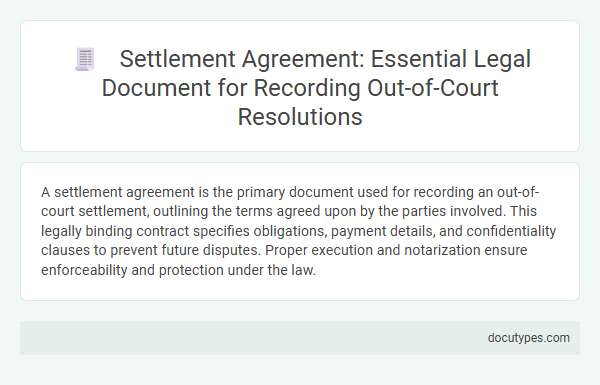A settlement agreement is the primary document used for recording an out-of-court settlement, outlining the terms agreed upon by the parties involved. This legally binding contract specifies obligations, payment details, and confidentiality clauses to prevent future disputes. Proper execution and notarization ensure enforceability and protection under the law.
Introduction to Settlement Agreements
Out-of-court settlements are legal agreements resolving disputes without proceeding to trial. These agreements help parties avoid lengthy and costly litigation.
The primary document used to record such settlements is the settlement agreement. This legally binding contract outlines the terms and conditions agreed upon by both parties. It ensures clarity and enforceability of the resolution reached outside the courtroom.
Definition and Purpose of Settlement Agreements
| Term | Settlement Agreement |
|---|---|
| Definition | A settlement agreement is a legally binding document that records the terms and conditions agreed upon by parties involved in a dispute, without proceeding to litigation or court judgment. It outlines the rights, responsibilities, and obligations resolved through negotiation or mediation. |
| Purpose | The purpose of a settlement agreement is to provide a clear, enforceable record of an out-of-court resolution. It aims to avoid lengthy and costly court trials by formalizing mutual consent, ensuring compliance with agreed terms, and preventing future disputes related to the same issue. |
| Key Features |
|
| Legal Implications | Once executed, a settlement agreement carries legal weight similar to a court judgment. Breach of this document can result in enforcement actions, including damages or specific performance. It eliminates the need for further litigation on the settled matters. |
Key Elements of a Settlement Agreement
An out-of-court settlement is commonly documented using a Settlement Agreement. This legally binding document outlines the terms agreed upon by the disputing parties without court intervention.
Key elements of a Settlement Agreement include the identification of parties involved and the detailed description of the dispute. It must also specify the terms of settlement, payment obligations, and any confidentiality clauses.
Legal Requirements for a Valid Settlement Agreement
An out-of-court settlement is documented using a settlement agreement, a legally binding contract between the parties involved. Essential legal requirements for a valid settlement agreement include mutual consent, lawful consideration, clear terms, and the capacity of the parties to contract. Properly drafted, this document ensures enforceability and prevents further litigation between the disputing parties.
Common Scenarios for Using Settlement Agreements
An out-of-court settlement is typically documented using a settlement agreement, a legally binding contract that outlines the terms agreed upon by the parties involved. This agreement ensures clarity and finality, preventing future disputes related to the matter.
- Employment Disputes - Settlement agreements resolve conflicts such as wrongful termination or discrimination claims without court involvement.
- Personal Injury Claims - Parties agree to compensation terms for injuries sustained, avoiding lengthy litigation processes.
- Business Contract Disputes - Companies use settlement agreements to settle breaches or disagreements discreetly and efficiently.
Your legal rights and obligations are clearly defined once a settlement agreement is signed, offering protection and peace of mind.
Drafting and Negotiating Settlement Agreements
What document is used for recording an out-of-court settlement? The primary document is a Settlement Agreement, which outlines the terms agreed upon by the parties involved. Drafting and negotiating settlement agreements require precise language to ensure enforceability and clarity of obligations.
Enforceability of Settlement Agreements
An out-of-court settlement is typically recorded using a settlement agreement document. This legally binding contract outlines the terms agreed upon by the parties, ensuring clarity and enforceability. For your protection, the enforceability of settlement agreements depends on the document being properly drafted, signed, and sometimes notarized to prevent future disputes.
Benefits of Out-of-Court Settlements
An out-of-court settlement is recorded using a settlement agreement, a legal document that outlines the terms agreed upon by the parties involved. This document serves as a binding contract to prevent future disputes related to the matter settled.
- Confidentiality - Settlement agreements often include confidentiality clauses protecting sensitive information from public disclosure.
- Cost-Effective - Avoiding court proceedings saves significant legal fees and court costs for all parties.
- Time-Saving - Resolving disputes outside of court accelerates the resolution process, reducing lengthy litigation delays.
Risks and Limitations of Settlement Agreements
A settlement agreement is the primary document used for recording an out-of-court settlement. This legally binding contract outlines the terms agreed upon by the parties to resolve a dispute without proceeding to trial.
Risks of settlement agreements include the possibility of ambiguous terms leading to future disputes and the inability to address all issues comprehensively. Limitations often involve enforceability challenges and the potential waiver of certain legal rights by the parties involved.
What Document Is Used for Recording an Out-of-Court Settlement? Infographic

